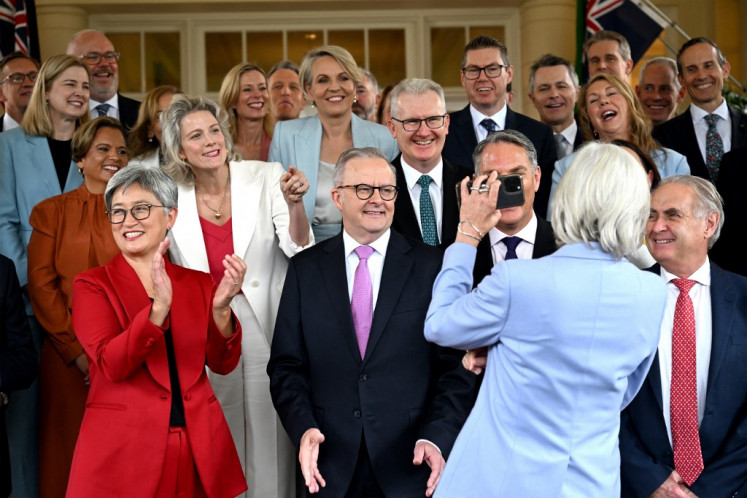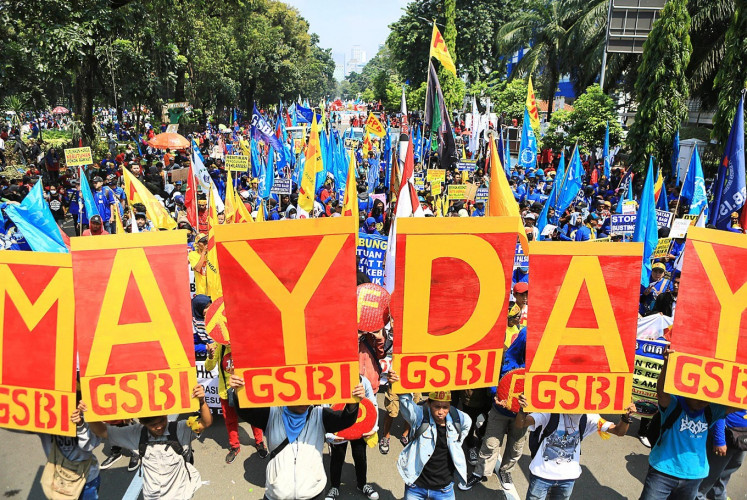Hoegeng's legacy can transform National Police
Former president Abdurrahman Wahid once said that there were only three police who could not be bribed: police statues, polisi tidur (speed bumps) and Hoegeng Imam Santoso, chief of the National Police during the Sukarno and Soeharto eras
Change text size
Gift Premium Articles
to Anyone

F
ormer president Abdurrahman Wahid once said that there were only three police who could not be bribed: police statues, polisi tidur (speed bumps) and Hoegeng Imam Santoso, chief of the National Police during the Sukarno and Soeharto eras.
On Sunday, former vice president Jusuf Kalla, National Police chief Gen. Sutarman and Corruption Eradication Commission (KPK) chairman Abraham Samad gathered at the launch of the book entitled Hoegeng: Polisi dan Menteri Teladan (Hoegeng: A Role Model Police officer and Minister) to share their admiration for the late general.
Kompas journalist Suhartono wrote the 139-page book, mainly based on an interview with Hoegeng's secretary, Soedharto Martopoespito.
'He served as National Police chief and then a minister of taxes, but he never conducted any malfeasance although he had plenty of chances to do so,' Kalla said during the launch at Pondok Indah Mall in South Jakarta.
Hoegeng headed the National Police from 1968 to 1971. During his tenure, then-president Sukarno also appointed him to key positions in the government, namely immigration chief (1960), minister of taxes (1965) and cabinet secretary (1966).
Abraham said Hoegeng was a clean and modest police general who had an impeccable reputation rarely seen among today's police generals. 'According to the book, Hoegeng was promoted to Medan Police crime investigations chief in 1956. When Hoegeng moved into his official house and saw that it had already been furnished, he grew furious and threw all the furniture out of the house,' he said.
'But now, as we can see, many new regional police chiefs still get the 'VIP treatment' from local businessmen.'
Abraham said many police officers wanted to eradicate corruption within the force but were stumbled by the system.
'I have discussed the matter with a number of middle-ranking police officers who said that they wanted change but were forced to take bribes because their superintendents had instructed them to collect a targeted amount of money every month,' he said.
Responding to the criticism, Sutarman said that he would instruct all police officers to read and take lessons from the book.
'The book came a bit late. If it was published earlier, we would not have had the simulator case,' he said, referring to the police's graft-ridden driving simulator procurement case in which former National Traffic Police commander Insp. Gen. Djoko Susilo was sentenced to 10 years in prison.
Hoegeng's rising career ended following the fall of Sukarno in 1967. Hoegeng reportedly had a bitter relationship with then president Soeharto that led to Hoegeng's 'forced retirement' in 1971.
'Retiring at the age of 49 was tough for my father because he still wanted to contribute more to the country,' Hoegeng's son, Aditya Hoegeng said.
Hoegeng then became an active member of the Group of 50, a strident government critics group. He and his wife Merry also regularly performed Hawaiian songs on TVRI until Soeharto instructed the state TV station to drop the show as retaliation against the Group of 50.
In 2004, Hoegeng died at the age of 83. As instructed in his will, Hoegeng was finally laid to rest in an ordinary cemetery in Bogor, West Java, and not at the Kalibata National Heroes Cemetery in Jakarta.









